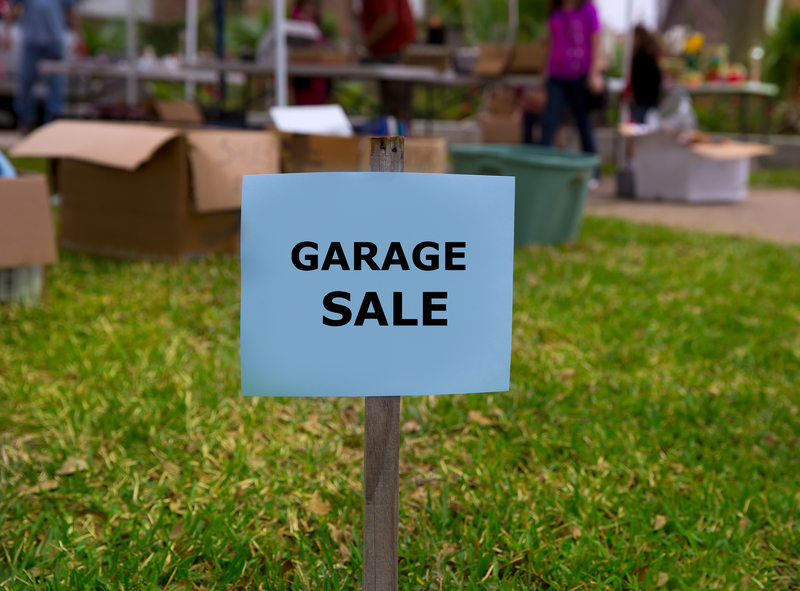Transform Your Home with Waste Prevention Ideas
Posted on 14/06/2025
Transform Your Home with Waste Prevention Ideas
Are you ready to turn your house into a sustainability champion? Waste prevention is more than a buzzword--it's a lifestyle that can enhance your home, save you money, and protect our planet. By embracing eco-friendly habits, you transform your home with waste prevention ideas that not only reduce garbage but also create a healthier environment for your entire family.
In this comprehensive guide, you'll discover a variety of actionable, sustainable, and creative ways to prevent waste at home. From rethinking your shopping habits to upcycling old items, let's embark on a journey to make your space greener and more mindful.

Why Waste Prevention Is Essential for Your Home
Every year, millions of tons of household waste end up in landfills, contributing to pollution and resource depletion. However, waste prevention starts with small steps that add up to significant change.
- Environmental impact: Less waste means fewer resources used and less pollution.
- Financial savings: Preventative habits reduce unnecessary purchases and utility bills.
- Personal well-being: A decluttered, organized home reduces stress and provides peace of mind.
With simple waste reduction ideas, you can make a major difference in your home's ecological footprint.
Smart Shopping Habits: The First Step in Waste Prevention
1. Embrace Mindful Buying
*Before heading to the store, ask yourself--do I truly need this?* Mindful shopping is the cornerstone of transforming your home with waste prevention ideas. Start by making a shopping list and sticking to it to avoid impulsive purchases that lead to excess waste.
- Opt for quality over quantity--choose products made to last.
- Bring your own reusable bags, produce sacks, and containers.
- Support brands with minimal or compostable packaging.
2. Buy in Bulk and Reduce Packaging Waste
Bulk shopping is a great way to cut down on single-use plastics and packaging. Find stores that allow bulk refills for staples like grains, nuts, or cleaning supplies. Don't forget to bring your own jars or eco-friendly containers!
3. Plan Meals to Minimize Food Waste
Nearly one-third of food produced globally is wasted. Meal planning helps you buy only what you'll use, reducing spoilage and trash:
- Write a weekly menu based on in-season, local produce.
- Organize your fridge with older items up front for quick use.
- Understand date labels: "Best by" doesn't always mean "expired".
Creative Reuse and Upcycling Ideas for Every Room
4. Repurpose Household Items
One person's trash is another's treasure! With a little creativity, you can give new life to everyday objects:
- Turn glass jars into storage for pantry goods, craft supplies, or bathroom essentials.
- Transform old t-shirts into cleaning rags or braided rugs.
- Upcycle furniture with fresh paint, new upholstery, or hardware.
5. DIY Decor and Functional Creations
Transform your home with waste prevention ideas by crafting decor from materials you already own:
- Make wall art from scrap wood, magazines, or fabric remnants.
- Create planters from used tin cans or plastic bottles.
- Build shelves or organizers from pallets or crates.
6. Host a Swap Party
If you have items you no longer need, organize a neighborhood swap. Exchange books, clothes, toys, or tools--everyone benefits and less goes to landfill!
Eco-Friendly Waste Management at Home
7. Composting: Nature's Recycling
Composting is one of the most effective ways to prevent waste:
- Set up a compost bin or pile for kitchen scraps and yard waste.
- Compost accepted items like coffee grounds, eggshells, and vegetable peels.
- Use finished compost to fertilize your garden and houseplants.
*Bonus: Composting reduces methane emissions from landfills and enriches your soil, closing the waste loop in your own backyard!*
8. Proper Recycling: Know the Rules
Recycling is vital, but only if done correctly. Familiarize yourself with your community's recycling guidelines to avoid contamination. Rinse containers, separate materials, and avoid "wish-cycling" items that aren't accepted.
Sustainable Bathroom and Kitchen Habits
9. Switch to Reusables
Cut down on disposables and single-use plastics with reusable swaps:
- Trade paper towels for washable cloths.
- Use silicone food covers instead of cling wrap.
- Opt for metal razors and bamboo toothbrushes.
- Invest in bulk refill systems for soaps and shampoos.
10. Minimize Water Waste
Being water-wise is part of holistic waste prevention:
- Fix leaks and install low-flow fixtures.
- Save and reuse greywater for plants.
- Turn off the tap when brushing teeth or washing dishes.
11. Reduce Food Packaging Waste
When shopping or storing food, choose minimal packaging whenever possible:
- Shop at local farmer's markets to buy produce without plastic.
- Bring your own containers to zero-waste stores.
- Buy from bulk bins and glass jars, avoiding plastic bags.
Clothing and Textile Waste Prevention
12. Embrace a Capsule Wardrobe
Build a minimalist wardrobe with versatile pieces. *Quality over quantity* reduces the need for frequent replacements and prevents textile waste.
13. Mend, Don't Discard
Before tossing damaged clothing, consider simple repairs:
- Sew on new buttons or patch holes.
- Re-dye faded fabrics to refresh their look.
- Upcycle old towels into cleaning cloths or pet bedding.
Green Cleaning and Maintenance
14. Make Your Own Cleaners
Most commercial cleaners come in single-use plastic bottles. Create your own effective solutions using ingredients like vinegar, baking soda, and essential oils. Store them in reusable spray bottles for ongoing use.
15. Maintain, Don't Replace
Routine maintenance extends the lifespan of household items and appliances:
- Sharpen knives and garden tools instead of buying new.
- Regularly clean HVAC filters and dryer vents.
- Descale your kettle and coffee machine to avoid breakdowns.
Involving Your Family in Sustainable Living
16. Educate and Empower
Make preventing waste a family affair. Teach children about sorting waste, reusing materials, and the importance of sustainability. Set up easy-to-follow systems for recycling and composting that everyone can use.
17. Lead by Example
*Walk the walk so others can follow.* Your habits will inspire neighbors, friends, and future generations to take action in their own homes.
Beyond the Home: Community Waste Prevention
18. Support Local Repair Cafes and Fix-It Events
Many communities offer repair workshops for electronics, bikes, and clothes. By fixing rather than binning, you extend the life of products and reduce overall waste.
19. Advocate for Less Packaging
Reach out to your favorite brands or local stores and ask for reduced or plastic-free packaging. Collective consumer voices can push industries toward sustainable solutions.
Measuring Your Progress and Setting Goals
20. Conduct a Waste Audit
Analyze what you throw away by performing a simple waste audit:
- Track the types and quantities of waste generated in a week.
- Identify patterns and set specific reduction goals, such as eliminating bottled water or reducing food waste by half.
21. Celebrate Successes
Every small change matters! Celebrate your milestones, whether it's a full compost bin, a month without buying new clothes, or consistently empty recycling bins.
Conclusion: Make Waste Prevention a Lifestyle
Transforming your home with waste prevention ideas is a journey, not a destination. By implementing even a few of these tips, you'll be on track to a cleaner house, healthier life, and more sustainable future. Start small, stay consistent, and remember--every action counts!
For more eco-friendly living inspiration, keep exploring and sharing your creative waste prevention solutions. Together, we can build a brighter, greener home and planet.

Frequently Asked Questions
What is the best way to begin waste prevention at home?
Start by conducting a waste audit to identify where you're generating the most waste. Then, implement simple changes such as meal planning and using reusables to reduce your environmental impact.
Can waste prevention save money?
Absolutely! You'll save by buying less, repairing rather than replacing, and cutting utility bills through resource-efficient practices.
What if I don't have access to recycling or composting programs?
Focus on reducing and reusing first. Donate, swap, or upcycle items, and seek out community options like repair events or local drop-off centers for recyclables and compostables.
How can I involve my children in waste prevention?
Make sorting and upcycling fun activities. Teach kids about the environmental impact of waste with projects, games, and home experiments.
Start Today: Transform Your Home with Waste Prevention Ideas
Adopting waste prevention practices empowers individuals and families to make a tangible difference. Whether you're minimizing food waste, upcycling old materials, or leading your neighborhood in green living, every effort helps create a sustainable home. Begin your transformation now and inspire others to follow your eco-friendly lead!









